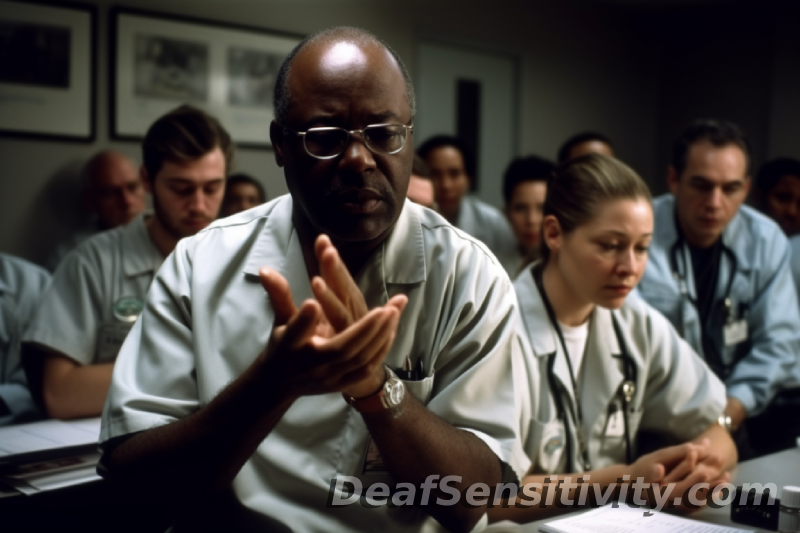In the health care industry, effective communication is crucial to providing exceptional patient care, ensuring proper diagnoses, and maintaining patient satisfaction. For Deaf or hard of hearing (DHH) patients, communication challenges can lead to misdiagnoses, inadequate treatment, and even life-threatening situations. Health care providers must recognize the importance of deaf sensitivity training to meet the unique needs of DHH patients, comply with U.S. regulations, and foster a more inclusive and empathetic health care environment. This article will explore the benefits of deaf sensitivity training for various health care providers and discuss how Deaf Sensitivity’s comprehensive training program can empower your organization to better serve DHH patients.
The Importance of Deaf Sensitivity in Health Care:
According to the World Health Organization, approximately 15% of the global population experiences some degree of hearing loss. This statistic highlights the pressing need for health care professionals to be equipped with the skills and knowledge to effectively communicate with DHH patients. Deaf sensitivity training is essential for building these competencies, as it promotes understanding and respect for the unique communication needs of DHH patients while also ensuring compliance with the Americans with Disabilities Act (ADA) and Section 504 of the federal Rehabilitation Act.
Benefits of Deaf Sensitivity Training for Health Care Providers:
1. Improved Patient Care:
Deaf sensitivity training enables health care providers to understand the unique communication needs of DHH patients, leading to improved diagnosis, treatment, and overall patient experience.
2. Enhanced Professionalism:
By understanding and respecting the diverse needs of DHH patients, health care professionals can demonstrate empathy and cultural competence, reflecting positively on their practice and fostering patient trust.
3. Regulatory Compliance:
Deaf sensitivity training helps to ensure that health care providers adhere to legal requirements set forth by the ADA and Section 504, reducing the risk of legal action and penalties. In other words, leveraging liability.
4. Competitive Advantage:
Offering deaf sensitivity training to staff can set health care organizations apart from competetors, showcasing a commitment to inclusivity and patient satisfaction.
Deaf Sensitivity Training for Various Health Care Providers:
1. Hospitals:
With high-stress environments and a diverse patient population, hospitals stand to benefit significantly from deaf sensitivity training. By equipping medical staff with the tools and knowledge to effectively communicate with DHH patients, hospitals can enhance patient care and satisfaction.
2. Clinics and Urgent Care Centers:
Deaf sensitivity training can help staff at these facilities quickly and accurately assess and treat DHH patients, ensuring they receive the appropriate care in a timely manner.
3. Behavioral Care Providers:
Communication is crucial in mental health care, and deaf sensitivity training can empower therapists, counselors, and psychiatrists to better understand and address the unique needs of DHH patients.
4. Dental Practices:
Deaf sensitivity training can help dental professionals alleviate patient anxiety and ensure proper treatment by facilitating clear communication with DHH patients.
5. Physicians’ Practices:
By understanding the unique communication needs of DHH patients, physicians can foster stronger patient-provider relationships, leading to better patient outcomes and satisfaction.
Deaf Sensitivity’s Comprehensive Training Program:
Deaf Sensitivity offers “I Never Gave THAT a Thought!”, a 4-hour, instructor-led training program designed to provide health care professionals with a firm understanding of how to interact with DHH patients effectively. The training is available both in-person and via live, interactive webinars, making it accessible and convenient for health care providers nationwide. Deaf Sensitivity’s training program can be customized to meet the specific needs of your organization, ensuring that all staff members are equipped to provide the highest level of care to DHH patients.
Conclusion:
Investing in deaf sensitivity training is a powerful step toward providing more inclusive, empathetic, and effective health care for DHH patients. By understanding and respecting their unique communication needs, health care professionals can deliver better patient care, ensure regulatory compliance, and set their organization apart from competitors. Deaf Sensitivity’s comprehensive training program, “I Never Gave THAT a Thought!”, is designed to empower health care providers with the skills and knowledge needed to serve DHH patients effectively and compassionately. Don’t wait – take action now to create a more inclusive and supportive health care environment for all.
Ready to improve your health care organization’s communication with DHH patients and comply with U.S. regulations? Contact Deaf Sensitivity at 480 615-8900 to learn more about the “I Never Gave THAT a Thought!” training program and schedule a session for your team today. Experience the transformative impact of deaf sensitivity training on your health care practice and witness the positive outcomes it brings to your patients and staff alike.

